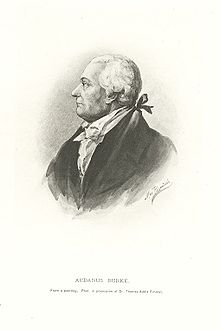Aedanus Burke
Aedanus Burke (born June 16, 1743 in Galway , Ireland , † March 30, 1802 in Charleston , South Carolina ) was an American politician . Between 1789 and 1791 he represented the state of South Carolina in the US House of Representatives .
Career
Aedanus Burke attended a theological seminary in Saint-Omer ( France ). He then traveled to the West Indies before settling in Charleston, South Carolina. When the American Revolution broke out , Burke joined this movement. He served in the South Carolina militia until 1778 and then served as a judge until the state was occupied by the British. Burke was a member of the House of Representatives from South Carolina between 1779 and 1788 . Between 1780 and 1782 he served again in the American Revolutionary Forces. Then he worked again as a judge.
In 1785, Burke was one of three commissioners to revise South Carolina state law. In 1788 he was a delegate to the assembly that ratified the United States Constitution. Burke himself did not agree with this constitution and voted unsuccessfully against ratification. Politically, he belonged to the anti-administration faction, which was in opposition to the first federal government under President George Washington .
He was elected to the US House of Representatives in the Second Constituency of South Carolina in the First Congress elections. There he took up his new mandate on March 4, 1789. In 1790 he waived in favor of his judicial office in South Carolina on a new candidacy. This meant that he was only able to complete one legislative period in Congress until March 3, 1791 . In 1799 Burke was appointed Registrar to the Court of Equity . He held this office until his death on March 30, 1802.
Web links
- Aedanus Burke in the Biographical Directory of the United States Congress (English)
- Aedanus Burke in the database of Find a Grave (English)
| personal data | |
|---|---|
| SURNAME | Burke, Aedanus |
| BRIEF DESCRIPTION | American politician |
| DATE OF BIRTH | June 16, 1743 |
| PLACE OF BIRTH | Galway , Ireland |
| DATE OF DEATH | March 30, 1802 |
| Place of death | Charleston , South Carolina |

